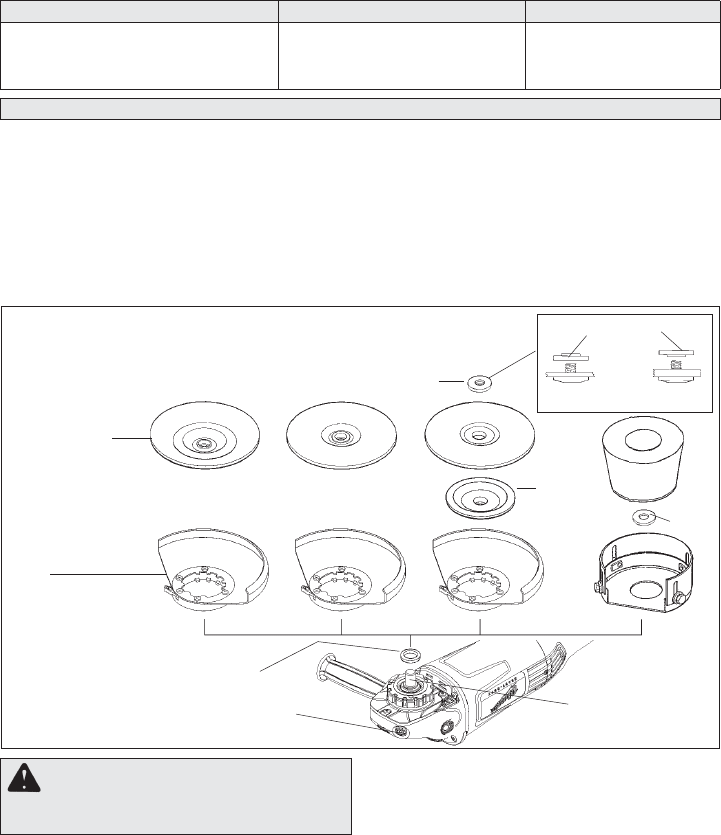
10
Aluminum Oxide Aluminum Zirconia Bi-Cut Ceramic
For fast cutting, general purpose discs for
most metal jobs. Best for cold-rolled steel,
stainless steel or metals requiring tough, fast
cutting, long lasting abrasives.
Unique grit pattern is arranged in clus-
ters for faster stock removal and clean-
ing. Ideal for removing paint from cars,
boats, etc. without clogging.
Lasts up to 3 times longer than
aluminum oxide discs. For
general metal working. Ideal
for tough jobs.
Installing Grinding Wheels
1. Unplug tool and place it upside down on a level
surface as shown. Remove any accessories from
spindle.
2. Thread nylon washer onto spindle. Attach guard
and grinding wheel using Fig. 8 to determine
type and order of assembly (See Fig. 2 and 3 for
attaching guard). NOTE: When installing Type
27 or Type 29 grinding wheels, position disc nut
according to wheel thickness.
Position the guard in the location which offers
USING GRINDING AND CUT-OFF WHEELS
best control and guard protection. For operat-
ing zones that provide maximum protection for
the operator, see Fig. 9. NOTE: When selecting
Type 11 grinding cup wheels, the guard’s skirt
should be adjusted so that no more than 1/8" of
the wheel extends beyond the guard.
3. To tighten, press the spindle lock button while
turning wheel or disc nut clockwise using the
spanner wrench provided.
4. To remove grinding wheel and guard, unplug tool
and reverse procedure.
Grinding wheels
A. Type 28 with hub
B. Type 27 with hub
Type 29 with hub
C. Type 27 with fl ange
Type 29 with fl ange
D. Type 11
Guard
E. Type 28
F. Type 27
G. Type 27
H. Type 11
Fig. 8
Spindle
Disc nut
Nylon washer
Type 27
fl ange
Type 11
fl ange
B
C
D
A
Spindle lock button
FG
H
E
1/4" thick
wheels
1/8" thick or
less wheels
Disc nut position
B
Care of Grinding & Cut-Off Wheels
Grinding and cut-off wheels should be protected from:
• wetness and extreme humidity
• any type of solvent
• extreme changes in temperature
• dropping and bumping
Grinding and cut-off wheels should bestored:
• in an organized way so wheels can be removed
without disturbing or damaging other wheels
• with their safety information
Grinding and cut-off wheels should NOT be:
• dropped
• rolled
• bumped
WARNING To reduce the risk of injury,
the operator should be instructed in the use,
care and protection of grinding wheels.
If any wheel is dropped, rolled, bumped, subjected
to extreme changes in temperature, or has come
into contact with solvents or wetness, discard wheel
immediately.
Troubleshooting
Deep scratches and circular marks can result from:
• Uneven pressure
• Using a partially glazed wheel - especially on
aluminum applications
• Dirt or loose metal on the workpiece
• Failure to constantly move across surface
Bluish discoloration of metal surface indicates:
• Excessive heat caused by circular motion in a
small area
• Excessive pressure
• Use of worn out or glazed wheels
Inspecting Wheels
Always handle wheels carefully to avoid damage.


















